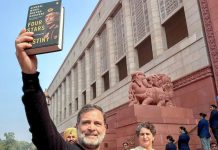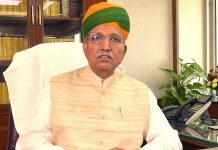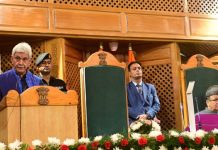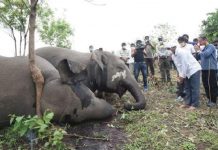
The manner in which Gulzar observes the happenings before documenting them in prose or lyrics or verse is quite elegant, writes HUMRA QURAISHI
Come August and its Gulzar saab’s birthday. Born on 18 August 1934 in the Undivided Punjab, he’s going strong. That grace, that attractive-poetic-romantic look to him hasn’t ebbed. He looks a shayar and also converses like a shayar with that gentle strain to his voice.
There’s something or everything so very different about Gulzar saab, that’s difficult to describe or even pinpoint. It’s not just the way he dresses so very elegantly in the white cotton kurta-pyjama, but the manner in which he observes the happenings before documenting them in prose or lyrics or verse.
Correct if I’m wrong but Gulzar saab’s prose and verse focusing on the Partition are hitting to such an extent that till date that pain and turbulence seems hovering around. He witnessed the Partition and experienced those upheavals, and the impact and imprints they’d left on him gets writ large in his writings; that pain manages to seep in each one of those words.
In fact, just before sitting down to write this column I re-read one of Gulzar saab’s earlier published volumes -‘Footprints on Zero Line-Writings On The Partition’ (Harper Collins) which he has dedicated to, ‘To Dina, my birthplace in Pakistan’. He dwells on Dina, and also on the masses going through turbulence… To quote Gulzar saab, “I have witnessed the Partition. I have experienced the Partition. Standing on Zero Line I am still watching the trail of Partition. Seventy years have passed. Time has not been able to blow off the footprints. I don’t know how long it will take for them to sink into history and be the past.”
Tucked in this volume Gulzar saab’s this absolutely hitting touching verse:
Walking up to Wagah with measured steps
When I came to stand at the Zero line
My shadow fell in Pakistan!
The sun was behind me
And my abbu was standing in front
He saw me
Resting his stick on the ground
He smiled and said,
‘When I had left my body there
I came back home, Punni!’
Abbu used to call me ‘Punni.’
‘I had hoped you would come,
For you had not received the news of my death
I knew you would come to bid me farewell!’
Startled, the moment paused
He tapped the ground with his stick
Stretching his hand, he said:
‘Come, let us go to Dina!’
My friends who had come to receive me at Wagah
Held me by the hand and took me to Lahore
In the din of the city no voices came back to me
But I could see a trail of silence
That led to Dina …
The latest from Gulzar Saab
And now comes the latest from Gulzar saab. In fact, during this entire lock down stretch he has been busy writing prose and also verse. In fact, the latest issue of the Indian Literature carries three poems of Gulzar saab — ‘Migrants, COVID -19’, ‘A Death in Covid -19’, ‘A Day In Lockdown’ and also one of his short stories, ‘Online’, on the Coronavirus times we are trying to survive in.
I spoke to Gulzar saab earlier this month to take his permission to quote his verse in my column and he agreed and then gently added that I must make sure to mention the name of the translator of his works, Rakhshanda Jalil . She is one of our finest translators and has translated his recent writings, from Urdu to English.
Though I’m tempted to quote a paragraph from his short story, more so as he uses real names of the well-known character from real life, but space constraints come in way.
Leaving you with Gulzar saab’s verse.
His this verse titled
‘Migrants, COVID-19’:
The pandemic raged
The workers and labourers fled to their homes
All the machines ground to a halt in the cities
Their hands and feet moved with the machines
For, they had planted their lives back in the villages
The acre or two of land, or perhaps five acres
The sowing and harvesting were all back there
Jowar, wheat, corn, bajra — all of it
Those divisions with the cousins and brothers
Those fights at the canals and waterways
The strongmen, sometimes from their side and sometimes from this
The lawsuits dating back to grandparents and grand uncles
Engagements, marriages, fields
Famine, flood, fear: will the skies rain or not?
They will go to die there – where there is life
Here, they have only brought their bodies and plugged them in!
They pulled out the plugs
‘Come let’s go home’ — and they set off
They will go to die there — where there is life!
Also, his this verse titled:
A Death in Covid- 19
Coronavirus had caught hold of him
He was in the General Ward
The window was in the wall near him
Like in the Allan Seager story
From where he could watch his village all day long
The road going towards his village
The bus racing own the road in the evening’s glow
Trailing a cloud of red dust
Like a Spiderman
His house was in the village Beechak, zila Palamon
Only two capsules
A bottle of water
Half-sucked lime —
This was all the wealth he left behind and moved on!
tehelkaletters@gmail.com












